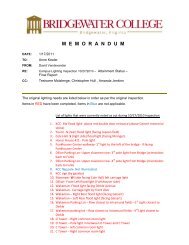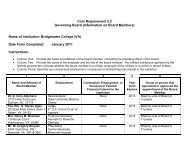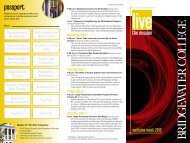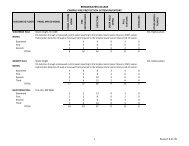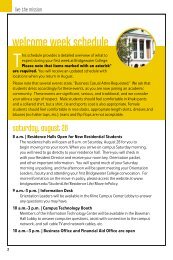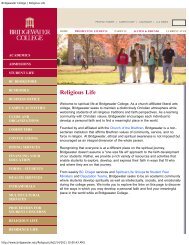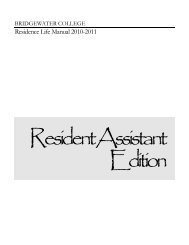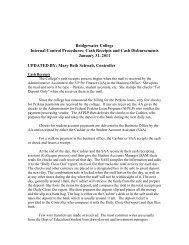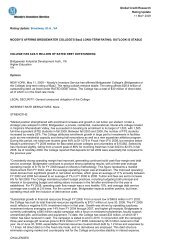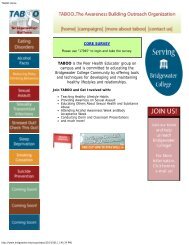Employee Handbook 2010 - Home - Welcome - Bridgewater College
Employee Handbook 2010 - Home - Welcome - Bridgewater College
Employee Handbook 2010 - Home - Welcome - Bridgewater College
Create successful ePaper yourself
Turn your PDF publications into a flip-book with our unique Google optimized e-Paper software.
FALL <strong>2010</strong> | BRIDGEWATER COLLEGE EMPLOYEE HANDBOOK<br />
quality of its life, academic and social, is shaped by the guiding principle of civility,<br />
and every member of the community is entitled to expect civil behavior from all<br />
other members. Students, faculty and staff have the right to be free from prohibited<br />
discrimination and harassment within the <strong>College</strong> community. Specifically,<br />
the <strong>College</strong> prohibits discrimination, including harassment, on the basis of race,<br />
color, religion, national or ethnic origin, sex, age, disability, or veteran’s status in its<br />
educational programs and activities and with regard to employment. Such conduct<br />
violates not only <strong>College</strong> policy, but may also violate state and federal law.<br />
Unwelcome verbal or physical conduct toward a member of the <strong>College</strong> community<br />
may constitute prohibited harassment, depending on the circumstances of each case.<br />
Unwelcome sexual advances, requests for sexual favors, or other verbal or physical<br />
conduct of a sexual nature or on the basis of gender may constitute prohibited<br />
sexual harassment, depending on the circumstances of each case. Whether sexual<br />
or non-sexual, such conduct constitutes prohibited harassment: 1) if the conduct<br />
has the purpose or effect of unreasonably interfering with an individual’s work or<br />
academic performance, or of creating an intimidating, hostile or offensive work or<br />
academic environment; 2) if submission to such conduct is an implicit or explicit<br />
condition of employment or academic success; or 3) if submission to or rejection of<br />
such conduct is used as the basis for an employment or academic decision.<br />
Any employee who believes herself or himself to be the object of prohibited discrimination<br />
or harassment by a member of the faculty or staff should consult with<br />
the Director of Human Resources or one of the designated officers listed below responsible<br />
for enforcement of the <strong>College</strong>’s policy. The designated officer will provide<br />
that person with information concerning <strong>Bridgewater</strong>’s policy and procedures<br />
for dealing with formal complaints or prohibited discrimination and harassment.<br />
Dr. Carol A. Scheppard, Vice President & Dean for Academic Affairs<br />
(540) 828-5607, cscheppa@bridgewater.edu<br />
Anne B. Keeler, Vice President for Finance<br />
(540) 828-5470, akeeler@bridgewater.edu<br />
Dr. Karen W. Wigginton, Vice President for <strong>College</strong> Relations<br />
(540)828-5782, kwiggint@bridgewater.edu<br />
Beverly S. Butterfield, Vice President for Institutional Advancement<br />
(540) 828-5450, bsbutter@bridgewater.edu<br />
Roy W. Ferguson, Jr., Executive Vice President<br />
(540)828-5307, rferguso@bridgewater.edu<br />
Victoria L. Ingram, Director of Human Resources<br />
(540) 828-5393, vingram@bridgewater.edu<br />
No employee will be disciplined or otherwise retaliated against for identifying such<br />
discrimination or harassment. It is important to inform the <strong>College</strong>; we cannot<br />
remedy the situation if we are unaware that a problem exists. Confidentiality will<br />
be maintained to the extent possible without jeopardizing a full investigation of the<br />
complaint.<br />
17



